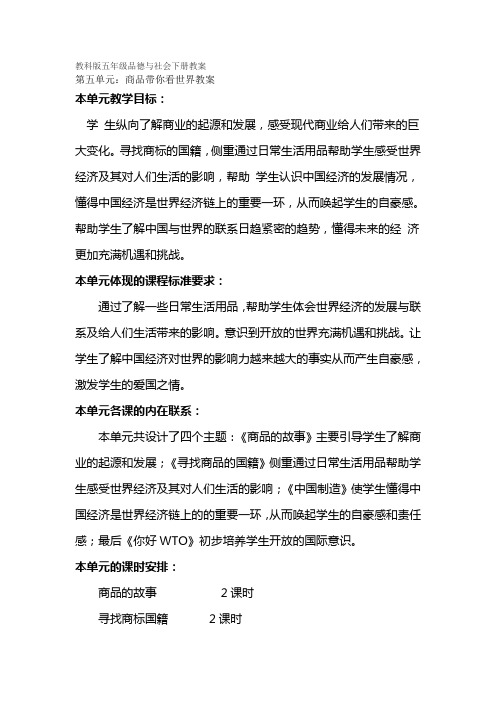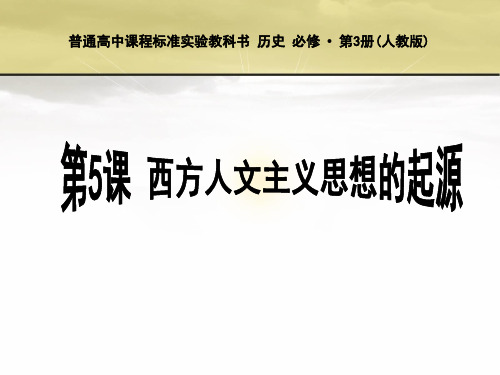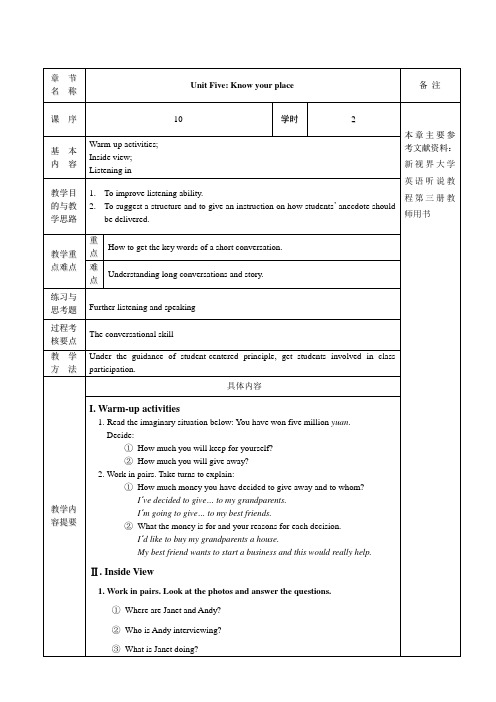新视界3第五单元教案汇总
- 格式:doc
- 大小:497.00 KB
- 文档页数:10

教科版五年级品德与社会下册教案第五单元:商品带你看世界教案本单元教学目标:学生纵向了解商业的起源和发展,感受现代商业给人们带来的巨大变化。
寻找商标的国籍,侧重通过日常生活用品帮助学生感受世界经济及其对人们生活的影响,帮助学生认识中国经济的发展情况,懂得中国经济是世界经济链上的重要一环,从而唤起学生的自豪感。
帮助学生了解中国与世界的联系日趋紧密的趋势,懂得未来的经济更加充满机遇和挑战。
本单元体现的课程标准要求:通过了解一些日常生活用品,帮助学生体会世界经济的发展与联系及给人们生活带来的影响。
意识到开放的世界充满机遇和挑战。
让学生了解中国经济对世界的影响力越来越大的事实从而产生自豪感,激发学生的爱国之情。
本单元各课的内在联系:本单元共设计了四个主题:《商品的故事》主要引导学生了解商业的起源和发展;《寻找商品的国籍》侧重通过日常生活用品帮助学生感受世界经济及其对人们生活的影响;《中国制造》使学生懂得中国经济是世界经济链上的的重要一环,从而唤起学生的自豪感和责任感;最后《你好WTO》初步培养学生开放的国际意识。
本单元的课时安排:商品的故事2课时寻找商标国籍2课时中国制造1课时你好WTO2课时主题活动一商品的故事活动目的:1、初步了解商业活动是由于人们生活的需要而产生的,体会世界经济的发展给人们的生活带来了巨大的变化;2、从日常生活用品的变化感受人们生活的进步,为祖国经济的发展感到自豪;3、让学生探究、交流,了解商业街的繁荣,寻找家庭用品的变化,体会家乡建设的成就和人们生活水平的不断提高,激发学生热爱祖国、热爱家乡的情感。
活动准备:学生:搜集古代商品交换的故事、收集平时不用的学习用品以及玩具准备开展跳蚤市场的活动。
活动过程:一、师生交流,引出话题1、你家日常生活中,吃的、穿的、用的是从哪儿买的?2、回忆:我们家乡的“商业街”的情景,学生交流:你能用什么词语来概括家乡的商业街?3、你能想象没有商店、没有商业街的生活是怎样的吗?二、探讨商业的起源1、讲故事:很久以前,一艘船在海上遇难,只有鲁滨逊和星期五俩人运气好,搭上了救生艇漂流到无人荒岛。

教学目标知识与技能1. 学生能够理解并运用观察的方法,发现生活中的缤纷世界。
2. 学生能够运用写作技巧,如比喻、拟人等,使作文更加生动有趣。
3. 学生能够根据题目要求,完成一篇结构完整、内容丰富的作文。
过程与方法1. 学生通过观察和讨论,学会从生活中发现素材,进行创作。
2. 学生通过例文学习,掌握写作的基本方法和技巧。
3. 学生通过写作实践,提高表达和创作能力。
情感态度价值观1. 培养学生对生活的热爱和观察力,激发学生的创作热情。
2. 培养学生积极向上的情感态度,通过写作表达自己的情感和价值观。
教学内容1. 观察身边的事物,发现生活中的缤纷世界。
2. 学习写作技巧,如比喻、拟人等,使作文更加生动有趣。
3. 根据题目要求,完成一篇结构完整、内容丰富的作文。
教学重点与难点重点1. 学会观察和发现生活中的缤纷世界。
2. 掌握写作的基本方法和技巧。
3. 完成一篇结构完整、内容丰富的作文。
难点1. 如何运用写作技巧,使作文更加生动有趣。
2. 如何根据题目要求,进行有效的创作。
教具与学具准备1. 教师准备:PPT课件、黑板、粉笔、教学视频等。
2. 学生准备:笔记本、笔、习作例文等。
教学过程1. 导入:教师通过PPT展示生活中的缤纷世界,引导学生进行观察和讨论。
2. 新课导入:教师讲解写作技巧,如比喻、拟人等,并给出例文进行分析。
3. 写作实践:学生根据题目要求,进行写作实践。
4. 交流与分享:学生互相交流自己的作品,教师进行点评和指导。
5. 总结与反思:教师对本节课的内容进行总结,学生进行反思和总结。
板书设计1. 生活中的缤纷世界2. 写作技巧:比喻、拟人等3. 作文结构:开头、中间、结尾作业设计1. 根据本节课的学习内容,写一篇以“我们眼中的缤纷世界”为主题的作文。
2. 互相交流作品,进行修改和提升。
课后反思通过本节课的学习,学生应该能够理解和掌握观察和发现生活中的缤纷世界的方法,以及写作的基本技巧。
在教学过程中,教师应该注重学生的实践和交流,激发学生的创作热情,提高学生的写作能力。

《美术第3册第五单元》的教案设计关于《美术第3册第五单元》的教案设计11.手拉手,好朋友一、教学目标:1.学习连续纹样的基本知识2.通过研究探索,启发学生运用对称的原理,设计、制作出各种有趣的连续纹样。
学习正确折叠纸张,运用简便方法设计纹样,以及运用正确的制作方法。
3.通过剪纸制作手拉手的好朋友,使学生感受友情的温暖,进一步激发学生热爱生活的情感。
二、教学重点、难点。
重点:学习连续纹样的基本知识,用剪、折、添画的方法制作一组手拉手的纸人。
难点:能用正确的折叠方法折叠纸张,使剪出的纸人连在一起。
三、课前准备(学生)剪刀、彩纸、彩色水笔或油画棒、胶水(教师)课件、范例、彩色纸、剪刀、彩色水笔或油画棒、胶水等四、教学过程1.魔术导入,尝试探索(1)教:今天这节课,老师要给大家表演一个小魔术,这个魔术呢先要用剪刀剪一剪,同学们猜猜看我剪的是什么?(剪好后展示,让同学们分析评价)教:我剪出了什么?是怎么样变出来的?你们想不想自己也来做一做(想!)那接下来把书本翻到第18页,看一看书本上的小朋友是怎么做的,看懂以后就可以自己拿起桌上的小纸条试着来剪一剪,自己选择题材,时间为5分钟。
看看哪位小朋友最聪明。
(2)学生自学,尝试制作,教师巡视。
2.作品欣赏,汇报交流。
展示同学们自己剪的作品,引导学生感受连续纹样的形式美和节奏美,感受拉手纸人的趣味性以及表现方法的多样性。
(1)教:老师发现有些小朋友剪的好朋友手没有拉起来(展示失败和成功的作品比较),老师发现这位小朋友剪的好朋友手都拉起来,你能站起来教教大家你是怎么做的吗?教:那同学们看看老师是怎么做的。
(讲解画和剪的时候要注意点什么,剪好后放在投影仪展示)要让你的魔术成功,两边都要连起来。
3. 展开想象,激发创意。
(1)教:那同学们再来看看老师刚刚剪得蝴蝶,现在这个蝴蝶只是单一的一种颜色,好像还不够漂亮,那我们可以怎么样呢?欣赏课件(画一些花纹,图案美化补充)4.布置作业,创作表现。


New Century College English (Book III) Unit 5 Text A Education in CyberspaceI. Teaching Objectives:1. To make clear the writer‟s purpose to write the text and the ideas about the pleasures of doingsomething badly now and then.2. To grasp the key words and phrases.3. To master the skills of writing and reading in this unit.1)To introduce a thesis with the specific-to-general structure.2)To understand idiomatic expressions.II. Teaching Content1. Lead-in Activities2. Text Organization3. Skill Learning in Writing and Reading4. Language Points( key words, phrases and difficult sentences)5. Grammar Focus (phrases as far as…be concerned & it’s time it’s high time)6. Guided Practice (exercises, oral practice and group work)III. Teaching Process1. Warm-up Questions (based on the listening material)1) What is your idea of an ideal university life?2) How does education improve your life?3).Can you feel the impact of modern technology on teaching and learning in your university?4).How does cyber education benefit students?5).How do students behave in cyber classrooms and traditional classrooms respectively?2. Text OrganizationPart I (Paras.1-3) I teach in cyberspacePart II (Paras.4-9) As a virtual professor, I teach without personally meeting my students.Part III (Para.10-17)Being a Guide on the Side, I have succeeded in getting my students to communicate their ideas actively and think critically, which is something I find hard to achieve in traditional campus education.Part IV (Paras.18-20) Cyber-teaching reflects the nature3. Language PointsDifficult Sentences1)A peculiarly honest answer came out of my mouth before I could think.(a) Paraphrase this sentence.(=Without thinking, I answered him frankly.)(b) Translate the sentence into Chinese.(=我不假思索,老老实实地答道。

新课标人教版小学语文第三册第五单元教案【教案】19 蓝色的树叶教学目标: 1.认识9个生字,会写10个字. 2.正确、流利、有感情地朗读课文。
3.懂得人与人之间应该互相帮助。
教学重难点: 1。
学习生字新词。
2。
理解园园为什么脸红了,从中体会到人与人之间要互相帮助。
课前准备:多课件课时安排:两课时教学过程:第一课时一、激发兴趣,导入新课同学们看过的树叶一般是什么颜色的?(绿色、、)怎么会有蓝色的树叶呢?读读课文就知道了。
二、初读课文,整体感知1。
自由读,借助拼音读准生字。
2。
教师范读,想想课文有几个自然段,每一个自然段的前面标上序号。
3. 说说课文讲的是什么事。
三、多种方法,识记生字1。
看实物识字:铅笔笔盒课桌美术课本2. 读句子识字(1)她把铅笔削好,放进铅笔盒,准备上美术课。
(铅、削、盒、术用区别)(2)她皱起眉头,吞吞吐吐地说:“我怕你不注意把笔尖弄断了。
”(皱、吐、注用区别)3.分辨翘舌音:术、惹、桌、注、皱。
4. 分辨多音字:吐吞吞吐吐呕吐削铅笔剥削 5. 比较形近字:术、木吐、土注、住盒、和削、消由、甲6。
画出文中生字组成的词语,读一读美术课绿铅笔惹人爱吞吞吐吐桌子盒子注意皱眉头风景四、指导写字 1. 分析字的结构特点2。
描红 3. 说说左右结构和上下结构的字在书写时要注意什么? 4。
指导(1)左右结构的字要写的左窄右宽。
(2)笔,写竹头时不要把短横写成点。
(3)铅,右上不是一个“几"字5。
学生练习写字,写后共同评议,比比谁写的工整、美观。
五、作业设计填上合适的词一()铅笔一()树叶一()同学一()椅子一()刺猬一()板凳第二课时一、复习1。
认读生字、词(课件出示)2。
“捡绿树叶”游戏。
每片绿树叶后藏着若干个生字,全部认对了这片绿树叶就送给她. 二、朗读感悟 1. 学习第一自然段(1)自由读一读(2)用“什么时候、谁、发生了什么”讲讲这一自然段主要写了什么。
2。
学习第二至四自然段(1)出示课文插图,请学生仔细观察李丽和林园园的表情,想想他们说了些什么。
统编版小学语文三年级上册第五单元习作:我们眼中的缤纷世界(教学设计)2023教学目标1. 让学生能够运用所学的语言表达自己的观点和感受,描述眼中的缤纷世界。
2. 培养学生的观察力和想象力,提高他们对周围世界的敏感度。
3. 培养学生的写作兴趣和自信心,让他们愿意分享自己的思想和感受。
教学内容1. 回顾和复习以前学过的描述自然和生活的词汇和句型。
2. 学习和练习如何用语言表达自己的观点和感受。
3. 引导学生观察周围的世界,发现其中的缤纷之处。
4. 指导学生进行写作,将自己的观察和感受表达出来。
教学重点与难点1. 教学重点:如何用语言表达自己的观点和感受,描述眼中的缤纷世界。
2. 教学难点:如何引导学生观察和发现周围世界的缤纷之处,以及如何将自己的观察和感受用语言表达出来。
教具与学具准备1. 教具:PPT,教学视频,教学录音。
2. 学具:笔记本,彩色笔,观察日记。
教学过程1. 导入:通过PPT展示一些缤纷世界的图片,引导学生观察并分享他们的感受。
2. 新课导入:通过教学视频和录音,教授学生如何用语言表达自己的观点和感受。
3. 实践活动:引导学生观察周围的世界,记录下自己的观察和感受。
4. 写作指导:指导学生将自己的观察和感受用语言表达出来,写成作文。
5. 分享与讨论:让学生分享自己的作文,进行讨论和评价。
板书设计1. 我们眼中的缤纷世界2. 内容:教学目标,教学内容,教学重点与难点,教具与学具准备,教学过程。
作业设计1. 观察日记:让学生记录下自己眼中的缤纷世界,包括观察到的景象和自己的感受。
2. 作文:让学生根据自己的观察和感受,写一篇作文,描述眼中的缤纷世界。
课后反思通过这次教学,我希望学生能够更好地理解和运用语言表达自己的观点和感受,同时也能够更加关注和欣赏周围的世界。
在教学过程中,我注意引导学生观察和发现,同时也鼓励他们勇敢地表达自己的想法。
在课后,我会根据学生的反馈和学习情况,进行教学反思和调整,以提高教学效果。
部编三年级上册第五单元《我们眼中的缤纷世界》教学设计教材分析本单元是统编小学语文教材第一个习作单元。
写作要素为“仔细观察,把观察所得写下来。
”就是让学生通过本单元学习,让学生学会观察,将观察所得写下来。
《义务教育课程语文课程标准》针对第二学段的习作目标有这样的描述:“观察周围世界,能不拘形式的写下自己的见闻、感受和想象,注意把自己觉得新奇有趣或者印象最深、最受感动的内容写清楚。
”本单元正是基于这一目标编排的。
三年级是学生习作的起步阶段,教学中应激发学生留心观察周围世界的兴趣,适时引导学生回顾精读课文、习作例文,把习得的学习方法运用到写作中来。
“初试身手”板块是基于“精读课文”之后的运用,这一板块是勾连“习作例文”、“单元习作”的桥梁,以发现学生习作问题为导向,为完成单元习作铺路。
教学时要注意收集学生尝试写作中的问题,运用习作例文中的方法去解决。
学情分析三年级从写话过渡到习作,学生有诸多不适应,习作时仍不能脱离图像、实物等支架,以片段练习为重。
本节课观察“芒果”并写下所得,对学生来说不难,但是要把“眼中的芒果”观察细致、写出特点,是有难度的,需要老师搭建支架。
教学目标1. 学习《我爱故乡的杨梅》细致观察事物的方法,运用这些方法观察芒果,能抓住特点。
2. 结合生活经验,按照一定的顺序,把自己眼中的芒果写清楚。
3. 与同学交流作品,学习修改方法。
教学重点:仔细观察芒果,并按一定的顺序把观察所得写下来。
教学难点:结合生活经验,按照一定的顺序,把眼中的芒果写清楚。
教学准备:多种水果实物 PPT教学过程一、读单元导语导入课题1.读“生活中不缺少美,只是缺少发现的眼睛”——【法国】罗丹2.读课题二、读初试身手发现问题1.读《芒果》片段,试评分学生自由读课本翻到68面“初试身手”第二个片段,评出分数。
2.师生合作玩游戏,找问题(1)指名读片段,教师出示实物,部分学生在教师的引导下尝试体验。
(2)换物读片段,师生交流发现。
Unit 5 Know Your PlaceI Active Reading: The Lonely AmericanⅰWarming up1. Work in groups of three or four and discuss the questions.1 Who is the most social?2 What is your idea of a social animal?3 What is the most antisocial thing you ever did?2. Look at the title of the passage and choose the meaning of a lonely person which is closest to your own idea.(a) someone who has no friends(b) someone who has no time for other people(c) someone who finds it difficult to relate to other people(d) s omeone who doesn’t like spending time in other people’s company(e) someone who prefers new technology to real peopleⅱSkimming◇Browse the passage within 8 minutes to get a rough idea about it.◇Answer the questions of Activity 2 and 3 on page 99.Answer the questions.1 How have the relationships that Americans have with their neighbors changed in recent years?People used to feel they had to be actively nice to their neighbors and see them regularly, but now they try hard not to disturb their neighbors or take up their time.2 In what way are Americans “pulled” as well as “pushed” to being isolated?Americans are pulled (attracted) towards isolation by an image of themselves as self-reliant people able to stand on their own two feet, and pushed (forced) to it by lack of time to socialize.3 How does being part of a social group affect people’s health?It can make people live longer, handle stress better, have an effective immune system and suffer less from various undesirable health conditions.4 Why is it important to recognize one’s loneliness?Until the problem is noted and acknowledged, there can be no steps towards a solution.5 Which are the small everyday choices which people make, and which can make them more or less isolated?The examples given are all of choosing to interact with people directly (seeing and talking to them in a shop, talking on the phone, going out with a friend) or of avoiding that sort of contact (e-shopping, listening to messages, watching a film at home on one’s own).6 What positive characteristics of Americans does the writer highlight in the passage?Self-confidence (Para 3), consideration for others, lack of time (Para 4), andself-reliance (Para 6 and 7).7 What negative characteristics does the writer highlight?Being too busy (Para 3), neglecting social relations (Para 5), and materialism (Para 3, 5 and 10).ⅲText analysisDifficult sentences1.Americans in the 21st century devote more technology to staying connected than any society in history, yet somehow the devices fail us: Studies show that we feel increasingly alone. (Line 1, Para 1)With their love of all the modern communications devices Americans should feel in close contact with one another, but actually they feel alone.2.We lurch b ack and forth, … How do we know when we’ve got it right? (Line 9, Para 1)The phrase “back and forth” here means from being sociable to being individualistic. To “get it right” means to find the correct balance. The sentences mean we swing from one extreme to another trying to be connected and at the same time independent. Each goal harms the other. Where can we find the correct middle position?3.First, let’s look at the frenetic busyness of our lives. (Line 1, Para 3) busyness: being busy, used as the noun business has taken on other meanings4. … fit whatever he or she wants into one small life. (Line 5, Para 3)It means to achieve all their goals or dreams in one short lifetime.5.America is the original “You can be anything you want if you really try, and it’s never too late to start trying!” country. (Line 6, Para 3)America is the place where the idea that anyone regardless of birth, education etc can achieve whatever they want started.6.Lives also are shaped by the respect and deference that is given to busyness –especially when it is valued above connection and community. (Line 6, Para 4) Lives are controlled by the attitude people have towards being busy as it is regarded as more important than social relationships. (Achieving things is valued more highly than ordinary human relations.)7.We treat socializing as if it’s a frivolous diversion from the tasks at hand rather than an activity that is essential to our well-being as individuals and as a community. (Line 1, Para 5)We regard being friendly to others as an unimportant amusement taking us away from important things. We should regard it as a very important part of being a healthy and happy person.8.Our relatives may be indignant, but even they know how hard it is. An unspoken understanding develops. (Line 9, Para 5)When we neglect our friends it does not really surprise them as they understand we are busy and accept that as a good excuse. Family are less happy with the situation, but do still understand.9.The pace of everyday life may push us toward isolation, but there is a pull, as well: a very seductive picture of standing apart as a victory, not a retreat. (Line 1, Para 6)We are not only pushed towards leading an unsociable life by our busyness, but are also drawn towards it / attracted to it by the idea of being like a cowboy, alone against nature. Being an independent loner is something very positive (a victory); not a loss (retreat).10.… a long series of American icons have idealized the concept of self-reliance. (Line 7, Para 6)Respected writers and thinkers have made depending on oneself and not on others an important cultural value that people should aim for.11.And when we do find ourselves isolated, … go-it-alone entrepreneurs. (Line 1, Para 7)When we do find ourselves isolated and apart from our group, we are comforted because we feel a part of a larger group, all the American loners, a long tradition of people who trusted themselves and achieved great things on their own.12.We may have isolated ourselves without entirely meaning to, but we also have ended up in a place that looks a lot like where we always knew that we were supposed to stand. (Line 9, Para 7)We may not have planned it, but it does not shock us as it is a situation that seems culturally right.13. It is also the last place on earth that a person would want to be. (Para 8)It is a terrible situation. American culture makes it feel right to be very independent and self-reliant, people are even proud of it, but the writer thinks it is very bad –people should be part of teams and communities.14. We once passed an elegant store … We watched the shop from across the street, keeping a safe distance.(Line 8, Para 10)We disliked the materialistic name so much that we felt nervous passing it and kept an eye on it as one might watch a dangerous dog on the other side of the road as one goes by.15. These little decisions are cumulative.(Line 5, Para 12)Small things in the end lead to big results.16. Feeling left out, unexamined, leads you to step back further. But feeling left out, when it’s examined, can lead people to work a little harder to reconnect. (Line 8, Para 12)When you feel you are not close to people, instinctively you will move even further away from them. But if you think about it, it should lead you to make the effort to remove the barriers and get closer.Words and phrases1.lurch释义:vi. to move suddenly in a way that is not smooth or controlled 蹒跚而行;颠簸着行进The train suddenly lurched forward.The plane lurched in the most terrifying manner.2.frenetic释义:a. done very fast and with a lot of energy, often by someone who is in a hurry 忙乱的;狂热的;非常激动的Eg .We're afraid that we won't adapt to the frenetic pace of life in the city.This frenetic activity is the sign of a worried man.3.capacity释义1 n. [C, U] (~ to do sth) the ability to do something 能力Her poor health limits her earning capacity.释义2vt. [C, U] the amount of something that can be put in a container or the number of people that a place has room for 容量;容积;容纳力The theater had a seating capacity of 1,400 people.4.deference释义n. [U] behavior that shows you respect someone and are willing to accept their opinions or decisions 敬重;尊从;恭敬Visiting officials were treated with great deference.5.considerate释义a. thinking about the feelings and needs of other people 关切的;体贴的;体谅的It was very considerate of you to let us know you were going to be late.6.intrude释义vi. (~ into / on / upon) to become involved in a situation in a way that is not welcome to other people, for example by getting involved in their private lives 干涉;打搅;侵扰Employers should not have the right to intrude on employees personal situations.7.frivolous释义1 a. lacking any real purpose or importance 无聊的;琐屑的Work time is too valuable to waste on frivolous games.释义2 a. behaving in a silly way in situations where you should be behaving in a serious or sensible way 轻佻的;轻浮的She just decided that she was a bit too frivolous to be a doctor.8.seductive释义 a. attractive and likely to persuade you to do something that may be harmful or wrong 有吸引力的;有诱惑力的This offer of a high salary and a free house is very seductive, but the work itself is very boring.9.be / get caught up in sth释义to be or get involved in something, especially something bad 被卷入某事,陷入某事(尤指坏事)That naughty kid was caught up in shoplifting.10.be / feel left out释义to feel that you are not accepted or welcome in a situation (觉得)被忽视;(觉得)被冷落Who would like to feel left out at such a function?11.on the outside释义used for talking about the way someone or something seems to people, when this does not show what they are really like 表面上;从外表看She seems calm on the outside but I know how worried she really is.ⅳCritical Thinking1 Do you think other people (and not just Americans) also feel increasingly alone?Families have got smaller for many social and economic reasons, so people have fewer relatives, and modern city housing tends not to build the sort of connections with neighbors people had in small villages.No way – China has such a huge population, there are always lots of people around that you can communicate with.2 Has new technology made us all less connected? If so, why?People say everyone sits around looking at their phones – it is true but they use those phones to connect –friends know far more about each other’s movements and thoughts than they used to. People never did talk to strangers. Buses weren’t full of conversation before phones came along.ⅴExercises.( Omitted)Language in UseStructure not + present participleNow rewrite the sentences using not + present participle.1 Staying in our hotel means you don’t have to worry about anything.Staying in our hotel means not having to worry about anything.2 Not to say goodbye to your hosts was rude.Not saying goodbye to your boss was rude.3 I prefer to arrive late than never to arrive.I prefer arriving late to not arriving.the last place / thing / person etc + clauseIt is also the last place (ie outside society) on earth that a person would want to be. The last … + clause is an informal way of referring to an unwanted or unexpected event or situation. Thus You were the last person I expected to see here means something like I never expected to see you here.1 I really don’t want to be in the office now.The office is the last place I want to be in now.2 I really don’t want to meet Glenda today.Glenda is the last person I want to meet today.II Talking point:➊Work in pairs and discuss the quotations. Decide which one(s) you agree with and tell why.ⅢFurther readingi Warming upRead the story and discuss the question.Are there street musicians in your city? Did you ever stopped to listen to their music and applauded for them?➊Choose the answer to the question which is most true for you. What makes you stop or turn your head when walking down the street?(a) A group of musicians performing.(b) A road accident.(c) A political demonstration.(d) A dangerous wild animal.(e) None of these things; I just keep walking.ii Reading skill: skimming& scanningiii Language points1. Here’s one from the life observation pile. (Para 1)This blog is based on one of the things the writer has noticed about life. (Imagining his mind as a desk with piles of notes on it on different topics)2.In high school I had the good fortune to have very silly friends.(Line 1, Para 2)The blog starts off on a challenging note: It is not normally regarded as lucky to have silly (a negative term) friends, but the writer is against convention and behaving as most people do. Their “silliness” was a creative and intelligent reaction to what was around them at school.3. This was wonderfully liberating. I learned how being bold, even if silly or bizarre, tends to put people on their heels. (Para 3)This gave us a marvelous sense of freedom. I discovered that doing as I wanted, even if sometimes it was rather foolish, surprised and unnerved other people, making them feel nervous. The sentences mean the writer enjoyed shocking people.put people on their heels: to surprise and unnerve people, making them nervous of something4. Each one with a guitar, or a banjo, singing their hearts out. (Line 4, Para 5)singing their hearts out: singing with all the passion and energy they could have 5. … and yet walk past musicians without even a momentary pause to absorb the vibe they are making. (Line 11, Para 6)People hurry by without stopping for even a few seconds to enjoy the music. vibe:This is a slang, meaning “the feeling you get from a person”.e.g. I’m sorry I didn’t like him. I felt bad vibes.6. It’s a trap. (Line 5, Para 8)Indifference is a lack of awareness so it is difficult to be aware of the problem of being indifferent.7. Am I on to something?Or should I shut up and move along? (Para 13)Have I discovered something important? Is what I am saying sensible? Or should I stop talking and get on with something else? The writer appeals to readers to know if his ideas are right or not.iv Words1.Indifference释义: n. [U] lack of interest or sympathy 漠不关心;无同情心;冷漠Eg:It is a matter of perfect indifference to me whether I am ever known to them or not.无论他们是否认识我,这与我都毫不相干。